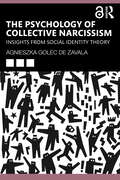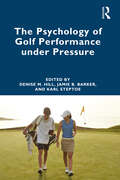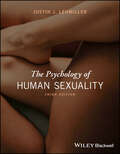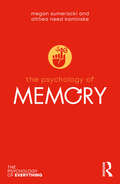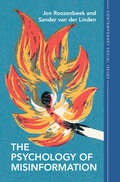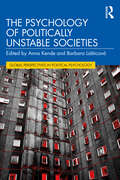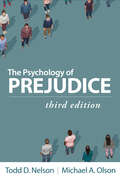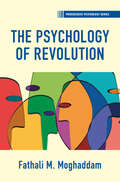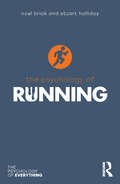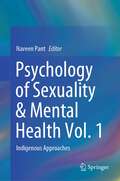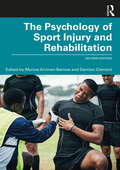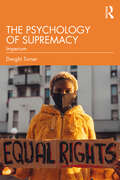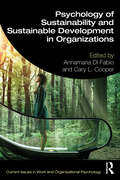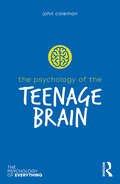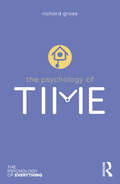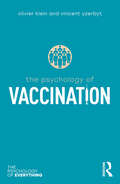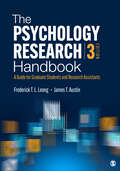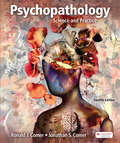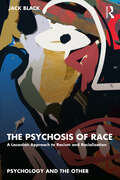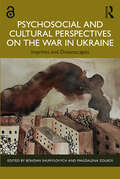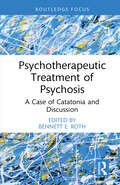- Table View
- List View
The Psychology of Collective Narcissism: Insights from Social Identity Theory
by Agnieszka Golec De ZavalaThe Psychology of Collective Narcissism is a ground-breaking text that presents a new theory of collective narcissism, a belief that exaggerated greatness of one’s own group should be but is not sufficiently appreciated by others. The book presents this concept against the background of social identity theory and research. It explores antecedent as well as social and political consequences of collective narcissism. The author discusses how this burgeoning theory and research can help to elucidate a wide range of psychological dynamics involved in pressing societal issues, such as the declining appeal of democracy, increasing populism, decreasing social solidarity, increasing societal polarization and prejudice, intergroup hostility and political violence, social inequality, and fake news and belief in conspiracy theories. Also referring to societal problems exacerbated by the COVID-19 pandemic, this highly topical work explores socially shared beliefs as risk factors when predicting responses to crises and highlights conditions in which collective narcissism can be expected. The author also reviews research on interventions reducing the link between collective narcissism, prejudice, and retaliatory intergroup hostility focusing on her recent research on mindfulness. This is a valuable read for academics and students in psychology and the social sciences, those interested in societal processes as well as professionals dealing with the impact of collective narcissism. The Open Access version of this book, available at http://www.taylorfrancis.com, has been made available under a Creative Commons Attribution-Non Commercial-No Derivatives (CC-BY-NC-ND) 4.0 license.
The Psychology of Golf Performance under Pressure
by Denise M. Hill Jamie B. Barker Karl SteptoeThe Psychology of Golf Performance under Pressure offers contemporary, research-informed information regarding the key psychological factors affecting golf development and performance under pressure. Through the authors’ substantive expertise – all of whom are notable scholars and/or practitioners in the field of golf psychology – the text provides a highly accessible “real world” application of theory to practice, through the provision of evidence-based guidance regarding how to maximise golf performance under pressure. Golf is a sport that has embraced sport psychology, with many of the highest ranked players in the world (male and female) openly working with a sport psychologist and advocating their importance. As a result, an increasing number of high-profile practitioners are working full-time within the sport around the world, encouraging trainee sport psychology practitioners to pursue their career within golf. Accordingly, there is an ever-increasing demand for high-quality information pertaining to the psychological demands of golf; the key psychological variables that affect golfing development and performance; and evidence-based strategies which enable effective golf performance under pressure. This novel text provides a comprehensive portrayal of the psychological factors which enable effective golfing development and optimal performance under pressure. A theoretical review of the pertinent psychological factors followed by the practical application of theory for the provision of “take home messages” will ensure that this book is of value, interest, and benefit for golfers, coaches, golf organisations, and even the parents of golfers, alongside sport psychology scholars, students, practitioners, and researchers alike.
The Psychology of Human Sexuality
by Justin J. LehmillerThe Psychology of HUMAN SEXUALITY New edition of an authoritative guide to human sexual behavior from a biopsychosocial perspective The Psychology of Human Sexuality is a comprehensive guide to major theoretical perspectives on human sexuality and the vast diversity of sexual attitudes and behaviors around the world, with broad coverage of topics including anatomy, gender and sexual orientation, sexual behaviors, sexual difficulties and solutions, sex work and pornography. Written from a sex-positive perspective with material that is inclusive and respectful of a diverse audience, the text includes cutting edge research on the origins of sexual orientation and gender identity, as well as new treatments for sexually transmitted infections and diseases. To aid in student learning, the text is accompanied by online resources, including a test bank and instructor slides. Separate chapters deal with attraction and relationship processes. The Psychology of Human Sexuality includes information on: Sex science studies that researchers have failed to reliably replicate since the 2nd Edition was published, and the broader “replication crisis” in psychology “Graysexual” identities that fall on the spectrum between allosexual and asexual, and the sex recession of modern times Recent studies that shed light on sexual behavior in cultures that have previously been the subject of very little study Sex and disability, and “take-home messages” to allow readers to implement beneficial changes in their lives An important and comprehensive text that provides readers with a better understanding of, and appreciation for, the science of sex and sexual diversity, The Psychology of Human Sexuality is an essential resource for students of human sexuality in both intermediate and advanced undergraduate courses.
The Psychology of Memory (The Psychology of Everything)
by Megan Sumeracki Althea Need KaminskeHow can I improve my memory? Do my emotions affect my memories? How will my memory change as I get older?The Psychology of Memory provides a unique insight into a fundamental part of being human, debunking many common misconceptions about what memory is, how memory works, and the accuracy of our memories. It explores the complexity of human memory, looking at how we remember different types of information and the impact of issues like ageing and emotion on how we create, store, and retrieve memories. Extremes of memory from so-called photographic memory to dementia are discussed, along with ways our memory can impact our everyday lives in educational and legal settings.Treating memory as malleable, dynamic, and active, The Psychology of Memory teaches us about how our individual memories function, and how we can harness this to see memory in a new way; to use the past, our experiences and information, in service of the present and future.
The Psychology of Misinformation (Contemporary Social Issues Series)
by null Jon Roozenbeek null Sander van der LindenKing Charles III is Dracula's distant cousin. Governments are hiding information about UFOs. COVID-19 came from outer space. These sound like absurd statements, but some are true, and others are misinformation. But what exactly is misinformation? Who believes and spreads things that aren't true, and why? What solutions do we have available, and how well do they work? This book answers all these questions and more. Tackling the science of misinformation from its evolutionary origins to its role in the internet era, this book translates rigorous research on misleading information into a comprehensive and jargon-free explanation. Whether you are a student, researcher, policymaker, or changemaker, you will discover an easy-to-read analysis on human belief in today's world and expert advice on how to prevent deception.
The Psychology of Politically Unstable Societies (Global Perspectives in Political Psychology)
by Anna Kende Barbara LášticováThis volume presents the latest developments in the field of political psychology by exploring the psychological processes that underlie political instability and how these can be addressed with psychological interventions. Written by a team of international leading researchers, the book critically re-evaluates the relevance of concepts primarily developed in WEIRD (Western, Educated, Industrialized, Rich and Democratic) contexts, for non-WEIRD societies. It focuses particularly on East-Central Europe and South Africa, showing how they enjoy some privileges of WEIRD countries but are also characterized by a troubled history and relative deprivation. Covering psychological concepts such as political trust, conspiracy thinking, authoritarianism, populism, autochthony, social identity and prejudice, the chapters illustrate that psychology has the tools to explain the recurring and shared problems of these societies. This original book is ideal for scholars and students in social psychology, political science and social science. It will also be useful reading for policy makers, political analysts and anyone who wishes to understand their role in creating more stable and more just societies.
The Psychology of Prejudice
by Todd D. Nelson Michael A. OlsonAddressing core questions about prejudice and stereotyping--their causes, consequences, and how to reduce them--this noted text is now in a thoroughly revised third edition with 50% new material. Written in an engaging, conversational style, the book brings social-psychological theories and research to life with compelling everyday examples. The text explores the personal and societal impacts of different forms of prejudice. Students learn about the cognitive, emotional, motivational, contextual, and personality processes that make stereotyping and prejudice more (or less) likely to occur. The book reviews anti-bias interventions and critically evaluates the evidence for their effectiveness. Every chapter concludes with an instructive glossary and discussion questions. New to This Edition *Full chapter on implicit prejudice. *Chapters on anti-gay and anti-fat prejudice. *New or updated discussions of timely topics: how children develop prejudice, structural racism, benevolent versus hostile sexism, how contact reduces prejudice, and more.
The Psychology of Revolution (Progressive Psychology)
by null Fathali M. MoghaddamBased on decades of psychological research and personal experience, Fathali M. Moghaddam presents a new and dynamic introduction to the psychology of revolution. He sets out to explain what does and does not change with revolution, using the concept of political plasticity or the malleability of political behavior. In turn, psychological theories of collective mobilization, the process of regime change, and explanations of what happens after regime change are discussed. This psychological analysis of the post-revolution period is pertinent because it explains why revolutions so often fail. General readers interested in learning more about the psychology of revolution, as well as students, researchers, and teachers in political psychology, political science, and collective action, will find this book accessible and beneficial.
The Psychology of Running (The Psychology of Everything)
by Noel Brick Stuart HollidayWhy do people run? How can I improve my running performance? Will running help me feel better? The Psychology of Running provides a unique insight into why running is such a popular form of exercise and competition. From evolutionary perspectives on why humans have needed to run and how our bodies have adapted for this function, to discussing evidence-based interventions that can improve running performance, the book delves into the psychological motivations and benefits of running. The book also considers ways in which running can be used for social change and life skill development, highlighting how such a simple activity can have benefits for our physical and mental health. Providing proven psychological strategies and techniques to help improve running performance and boost our individual self-belief, The Psychology of Running shows us how we can enjoy running, no matter our age or ability.
Psychology of Sexuality & Mental Health Vol. 1: Indigenous Approaches
by Naveen PantThis book focuses on indigenous and Indian concepts of sexuality, exploring its psychology and its relationship with mental health. Through theoretical, review, exploratory and mixed approaches, the book delves into common fields of thought regarding indigenous sexuality which relate to psychology and mental health. In the first section of the book, ‘Psychology of Sexuality & Indigenous Approaches’, the book discusses various indigenous aspects of sexuality, such as Indian indigenous, Hindu, and Buddhist. The second section of the book, ‘Indigenous Psychology of Sexuality and Mental Health’, discusses indigenous aspects combined with sexuality and mental health.
The Psychology of Sport Injury and Rehabilitation
by Monna Arvinen-Barrow Damien ClementWritten by internationally known experts The Psychology of Sport Injury and Rehabilitation draws on the latest research in sport psychology and sports medicine. Using case studies to augment the reader’s experience, this new edition emphasizes the importance of a holistic, interprofessional approach to sport injury management and care. By doing so, the book provides injured individuals, their families, and healthcare professionals a thorough overview of how psychology plays a role in sport injury prevention, rehabilitation, and return to participation process. Athletes routinely use psychological skills and interventions for performance enhancement but, perhaps surprisingly, not always to assist in recovery from injury. This book demonstrates the ways in which athletes and practitioners can transfer psychological skills to an injury and rehabilitation setting to enhance recovery and the well-being of the athlete. Psychology of injury is an integral part of sport injury prevention, rehabilitation, and return to participation process. The second edition of The Psychology of Sport Injury and Rehabilitation is a comprehensive text grounded in biopsychosocial theory and scientific evidence. The fully revised second edition is an important resource for students, academic scholars, and applied practitioners working in sport psychology, sports medicine, sports coaching, and other related healthcare professions.
The Psychology of Supremacy: Imperium
by Dwight TurnerThe Psychology of Supremacy brings a developmental, philosophical and psychological lens to understanding the systems embedded within the socially constructed aspects of our intersectional identities. Offering a philosophical understanding of supremacy and its meaning within counselling and psychotherapy, the book examines just how and why supremacy exists, some of the psychology behind supremacy, and how it impacts clients, training, and practice. Chapters offer means and ways of observing and challenging systems of supremacy as they may appear within counselling and psychotherapy relationships. Featured psychotherapeutic case studies detail stories from participants who have endured the painful experience of being involved in the power structures of supremacy. A must read for psychotherapists and counsellors, this book will also appeal to psychologists, social workers, qualitative and quantitative researchers, and anyone else interested in further deepening their understanding of supremacy, privilege, and otherness.
Psychology of Sustainability and Sustainable Development in Organizations
by Annamaria Di Fabio Cary L. CooperThis volume answers calls for improving sustainability and sustainable development in organizations from a psychological point of view. It offers a range of perspectives on the current research in the psychology of sustainability and sustainable development to highlight effective ways of improving well-being and healthy sustainable development in organizations. Section 1 introduces the concept of the psychology of sustainability and sustainable development as well as macro topics of related issues in organizations. Section 2 focuses on themes traditionally recognized in organizational psychology literature, such as performance, negotiation, leadership, resistance to change, innovation, and digital transformation. Section 3 presents variables to enhance sustainability and sustainable development in organizations and considers levels of prevention. Topics include humor awareness as a primary prevention resource in organizations, intrapreneurial self-capital as an individual preventative strength, compassion within organizations, perfectionism as an inhibitor in organizational contexts, and job crafting from individual to collaborative to organizational, meaningfulness and sustainable careers. With a clear psychological focus on the topic of leading sustainability efforts, this book will be of great interest to students and academics who want to learn more about corporate sustainability. It is also a useful resource for business executives, team leaders and managers.
The Psychology of the Teenage Brain (The Psychology of Everything)
by John ColemanWhy do teenagers stay up late and struggle to get up in the morning? Do teenagers really take more risks? What is happening with teenagers’ hormones? The Psychology of the Teenage Brain offers all those involved in teenagers’ lives insight into what’s happening in their brains and how understanding them can improve relationships and communication at this crucial stage. It explains key topics, including the way the brain changes during adolescence, the role of hormones, and what we really know about risk and resilience, sleep and peer pressure. It challenges the stereotype of the ''snowflake generation'' and explores young people’s mental health. Written for all parents and caregivers, this book will help with the challenges of having a teenager in the home. It also offers crucial understanding for all students and practising professionals in the fields of social work, counselling, health and education who work with teenagers.
The Psychology of Time (The Psychology of Everything)
by Richard GrossWhat is the meaning of time? Do we have an internal clock? Can time speed up or slow down?The Psychology of Time considers how we define, describe, and experience time. From a discussion of how our language around time is dependent on metaphor, to the role of biology in controlling our bodily experience of time, the book delves into how the finitude of life is a given human experience. It looks at how we reflect on the passage of time throughout our lives, and how our experience of time can be influenced by diverse factors including our age, gender, health, and culture.Offering insights into something we are all immersed in, but often give little thought to, The Psychology of Time shows us how our understanding and experience of time can influence our everyday behaviour.
The Psychology of Vaccination (The Psychology of Everything)
by Olivier Klein Vincent YzerbytWhy do some people choose to be vaccinated and others do not? What is the difference between vaccine hesitancy and anti-vaccinism? What can social psychology tell us about attitudes towards vaccination?The Psychology of Vaccination identifies the social psychological drivers of vaccine mindsets, to explore why some people choose to be vaccinated, some are hesitant, and others refuse. It explores the socio-demographic factors related to vaccine hesitancy and considers the role of motivation in making this health decision. The book focuses on how individuals are social beings, inserted into a web of influences that guide their behaviour, and considers the impact this may have on their health choices.Not only aimed at the convinced, but also for all those who have doubts about vaccination, The Psychology of Vaccination offers an insightful look at our health behaviours and considers whether it is possible to affect health behaviour change.
The Psychology Research Handbook: A Guide for Graduate Students and Research Assistants
by Frederick T. L. Leong James T. AustinIn the Third Edition of The Psychology Research Handbook editors Frederick T. L. Leong and James T. Austin have assembled experienced expert researchers to provide graduate students and research assistants with a comprehensive framework for conducting many types of psychology research. The book is organized around the idea of a "research script," following the step-by-step process of research planning, design, data collection, analysis, and disseminating research. Many chapters are coauthored by advanced graduate students to give their fellow students a sense of real-world research, adding to the clarity and practicality of many chapters. Students and instructors alike will appreciate chapters on topics typically missing from introductory methods texts, including applying for research grants, dealing with journal editors and reviewers, working within research teams, and conducting cross-cultural research. Structures such as recommended readings and exercises guide students to develop and expand their research skills. New chapters include Power and Evidence, IRB as Critical Collaborators in Research, Alternative Data Collection Strategies, Structural Equation Modeling and Replicability and Reproducibility. A comprehensive, easy-to-understand guide to the entire research process, this book quickly and efficiently equips advanced students and research assistants to conduct a full research project.
The Psychology Research Handbook: A Guide for Graduate Students and Research Assistants
by Frederick T. L. Leong James T. AustinIn the Third Edition of The Psychology Research Handbook editors Frederick T. L. Leong and James T. Austin have assembled experienced expert researchers to provide graduate students and research assistants with a comprehensive framework for conducting many types of psychology research. The book is organized around the idea of a "research script," following the step-by-step process of research planning, design, data collection, analysis, and disseminating research. Many chapters are coauthored by advanced graduate students to give their fellow students a sense of real-world research, adding to the clarity and practicality of many chapters. Students and instructors alike will appreciate chapters on topics typically missing from introductory methods texts, including applying for research grants, dealing with journal editors and reviewers, working within research teams, and conducting cross-cultural research. Structures such as recommended readings and exercises guide students to develop and expand their research skills. New chapters include Power and Evidence, IRB as Critical Collaborators in Research, Alternative Data Collection Strategies, Structural Equation Modeling and Replicability and Reproducibility. A comprehensive, easy-to-understand guide to the entire research process, this book quickly and efficiently equips advanced students and research assistants to conduct a full research project.
Psychoneuroendokrinologie in der psychosozialen und psychotherapeutischen Praxis: Ein biopsychosozialer Coachingansatz
by Julia WiederhoferWas sind Hormone und welche Bedeutung haben sie für die Psyche bzw. unser Verhalten? Beeinflussen Hormone unsere Psyche bzw. unser Verhalten? Kann unser Verhalten unsere Hormone beeinflussen? Besteht ein Zusammenhang zwischen Hormonen und psychischen Störungen? In diesem Buch wird das Wechselspiel zwischen neurobiologischen Grundlagen psychischen Erlebens und Verhaltens, den endokrinen Vorgängen sowie psychosozialen Umwelteinflüssen gezeigt. Dabei wird die Grundlagenforschung, sowohl der wissenschaftlichen Disziplin Endokrinologie als auch der Psychoneuroendokrinologie dargestellt und so erläutert, dass auch Leserinnen ohne medizinische oder neurobiologische Vorkenntnisse diese komplexen Wissenschaften verstehen. Dieses Buch zeigt zum ersten Mal, wie diese interdisziplinären Erkenntnisse in einen biopsychosozialen Coachingansatz implementiert werden können, der sowohl zur Aufrechterhaltung als auch zur Förderung der psychischen Gesundheit dient. Ein Coachingansatz, der für die psychosoziale und für die psychotherapeutische Praxis geeignet ist.
Psychopathology: Science and Practice
by Ronald J. Comer Jonathan S. ComerPsychopathology: Science and Practice (formerly Abnormal Psychology) is the market-leading introduction to mental disorders and their treatment using vivid case studies, compelling examples, and the latest research.
The Psychosis of Race: A Lacanian Approach to Racism and Racialization (Psychology and the Other)
by Jack BlackThe Psychosis of Race offers a unique and detailed account of the psychoanalytic significance of race, and the ongoing impact of racism in contemporary society. Moving beyond the well-trodden assertion that race is a social construction, and working against demands that simply call for more representational equality, The Psychosis of Race explores how the delusions, anxieties, and paranoia that frame our race relations can afford new insights into how we see, think, and understand race’s pervasive appeal. With examples drawn from politics and popular culture—such as Candyman, Get Out, and the music of Kendrick Lamar—critical attention is given to introducing, as well as explicating on, several key concepts from Lacanian psychoanalysis and the study of psychosis, including foreclosure, the phallus, Name-of-the-Father, sinthome, and the objet petit a. By elaborating a cultural mode to psychosis and its understanding, an original and critical exposition of the effects of racialization, as well as our ability to discern the very limits of our capacity to think through, or even beyond, the idea of race, is provided. The Psychosis of Race speaks to an emerging area in the study of psychoanalysis and race, and will appeal to scholars and academics across the fields of psychology, sociology, cultural studies, media studies, and the arts and humanities.
Psychosocial and Cultural Perspectives on the War in Ukraine: Imprints and Dreamscapes
by Bohdan Shumylovych Magdalena ZolkosThis innovative and important book explores how war imprints on culture and the psychosocial effects of war on individuals and societies, based on the first few months after the outbreak of war in Ukraine in 2022.The book approaches the conflict in Ukraine through the prism of creative and artistic material alongside scholarly analysis to highlight the multiplicity of subjective experiences. Essays are complemented by material from the ‘war diaries’, which comprise day diaries, dream diaries, artistic and poetic material composed by students and academics in February and March 2022. With chapters focusing on fear, ruptures and resistance, the book examines different aspects of subjective, cultural and embodied experiences of war. It examines elements that dominant perspectives of war often overlook; the quotidian, personal and emotive ways that war is registered individually and collectively in societies and cultures.Highlighting different narratives that illuminate the complex effects of war, this book is highly relevant for postgraduate students, researchers and advanced undergraduate students in the fields of cultural psychology, psychosocial studies, peace and conflict studies and cultural history.Chapter 4, Chapter 5, Chapter 7 and Chapter 10 of this book are freely available as downloadable Open Access PDFs at http://www.taylorfrancis.com under a Creative Commons Attribution-Non Commercial-No Derivatives (CC-BY-NC-ND) 4.0 license.To read the online archive of Two Months of War, please visit the Urban Media Archive of the Center for Urban History (Lviv, Ukraine): https://uma.lvivcenter.org/en/collections/178/interviews
Psychotherapeutic Treatment of Psychosis: A Case of Catatonia and Discussion (Routledge Focus on Mental Health)
by Bennett E. RothThis book explores the psychoanalytic treatment of a patient with psychosis from a range of different psychotherapeutic perspectives.The psychotherapeutic treatment of psychotic individuals is both rare and controversial with a limitation in availability of clinical material. As psychoanalytically oriented therapy is private, it is almost impossible to “witness” the actual human interaction of therapeutic process. While catatonia is a rare disorder, there are many attempts to hypothesize a theoretical psychic structure for the range of disorders called psychotic. Therapists rarely report “successful” outcomes of long and unusual treatments. In the book, a fragment of the treatment of a catatonic adolescent is reconstructed as an endeavor in representing that which is not clinically representable. Following the case report, which also reveals part of the history of the therapist, prominent analytic clinicians of different theoretical orientations share their understanding and comment on the material revealed.With a fresh perspective on psychoanalytic treatment of psychosis, this book is essential reading for psychoanalysts, psychotherapists, and clinicians involved in the treatment of psychosis.
Psychotherapie von Anfang bis Ende: Schritt für Schritt durch den therapeutischen Prozess
by Markus GmelchDie Ergebnisse der Psychotherapieforschung können am stimmigsten von einem kontextuellen Metamodell interpretiert werden: In der therapeutischen Beziehung werden hilfreiche Kontexte für KlientInnen angeboten und individuell angepasst, die diese zu Klärung, Veränderung und Ermutigung nutzen können.Vor diesem Hintergrund stellen sich angehenden PsychotherapeutInnen ganz praktische Fragen: Was macht denn eine Beziehung „therapeutisch“? Wie kann ich den Prozess von Beginn an hilfreich strukturieren? Wie gelange ich zu „wohl formulierten“ Therapiezielen? Wie kann ich KlientInnen ihre eigenen Interventionen finden und erfinden lassen? Wie gehe ich mit „unmotivierten“ KlientInnen um? Und was mache ich bei Rückschritten? Wie kann ich mich auf jede einzelne KlientIn individuell einstellen und „anschlussfähige“ Fragen stellen? Und was kann ich tun, dass KlientInnen langfristig auch ohne mich zurechtkommen?Dieses Lehrbuch vermittelt PsychotherapeutInnen Grundlagen zum gesamten therapeutischen Prozess und bietet Orientierung und Struktur für zahlreiche schwierige Situationen an - Heuristiken, die wiederum genutzt und angepasst werden können. Viele Transkripte und Beispiele veranschaulichen und konkretisieren die Vorgehensweise.
Psychotherapieausbildung in Österreich: Überblick Methoden Entscheidungshilfen
by Natalie Eller Gerhard StummDieses Buch bietet eine Orientierungshilfe für den Ausbildungsweg zur Psychotherapeut:in, der in Österreich mehrstufig angelegt ist. Nach einem methodenübergreifenden ersten Abschnitt folgt die langjährige Fachausbildung, für die rund 20 anerkannte Psychotherapiemethoden und über 40 Ausbildungseinrichtungen zur Auswahl stehen.Die Methoden und Ausbildungsangebote sind - differenziert nach psychodynamischen, humanistischen, systemischen und verhaltenstherapeutischen Ansätzen - kompakt nach einem einheitlichen Raster dargestellt. Dies ermöglicht einen Vergleich der inhaltlichen Ausrichtung der verschiedenen Methoden sowie der Schwerpunktsetzung, Dauer und Kosten der einzelnen Ausbildungswege.Das Kompendium liefert darüber hinaus wertvolle Informationen und Tipps zur Ausbildungssituation, zu den gesetzlichen Grundlagen, zu den Berufsaussichten, zur Akademisierung und zur zukünftigen Gestaltung des Ausbildungsangebots in Österreich.Es bietet somit eine praktische Entscheidungshilfe und unterstützt Interessent:innen und Psychotherapeut:innen in Ausbildung in Österreich in Hinblick auf ihren Ausbildungsweg.
